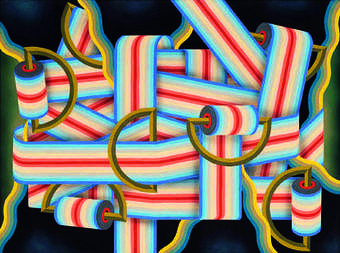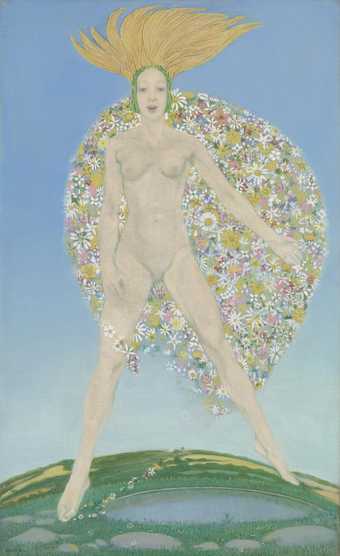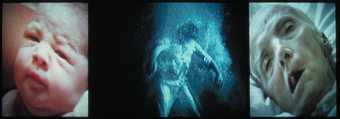The universe that I'm creating with my practice is really meant to act as a mirror, in the same way that every character that I'm trying to create is a reflection or a site for people to see themselves.
My name is Sin Wai Kin. I'm an artist using speculative fiction to deconstruct and reconstruct social narratives.
In my practice I think the characters came before the universe, I started with one character who was my original character that I called Victoria Sin but as more characters were born I started to realise that the relationship between the characters was just as important as the characters themselves and that's what a universe is, it's a really complicated mesh of relationships.
I really want people to exist in my world and see it as kind of like a new perspective that they can look back on their everyday life with.
So I would say the most important influence in my work is science fiction.
I was a big sci-fi nerd when I was young and when I came back to it as an adult I think what really struck me was the way that certain authors could create this other world and create a fantasy that you can work towards being a reality.
There's also philosophy that uses fantasy for example like the Zhuangzi which uses fantasy allegories in order to kind of like illustrate and play out relationships and conversations about what it means to exist in a world that's constantly changing and how to really be at peace with the fact that nothing is ever going to be the same.
So the presence of my body in my work was never really a conscious decision I think it started with my first character. I was looking back on it really trying to unpick very personal embodied relationship with Western femininity that I had been socialised with, that I had been conditioned to want and I found that by embodying and then disembodying this kind of ideal image like many times I was able to kind of separate what I wanted and what other people wanted from me.
And I continue to do that with all of my characters.
I remember reading on a piece of paper in Octavia Butler's archives 'the more personal, the more universal' and that's really a cornerstone of my practice.
So I am investigating these very personal relationships that I have with different binaries with different social narratives and then abstracting them through a lens of speculative fiction, of drag, of fantasy and making them things that everybody can identify with because we all have an experience of existing in binary narratives.
My process of storytelling I think is different with every work but usually it starts with writing and when I start to build a script I'm pulling from small bits of writing and trying to find the through line of the themes that I've been kind of experiencing or thinking through.
While I'm doing this writing I'm also drawing, I'm doing character sketches. Things often kind of come together very slowly until something fits into place. It's like a puzzle often that I'm trying to piece together and that continues not only through the writing process but through the filming process or in the case of the performance it's still being realised in the actual performing of the work and the relationship between me and the audience.
I mean I think one of the most interesting things about making films for me is going from like the shooting process to the post-production process and the edit is really where I see the work become itself, you know, it's like sculpting and the kind of sound element it starts bringing in something totally different.
It's Always You features four of my characters in a boy band: The Storyteller, The Universe, The One and Wai King.
I think a boy band is a really perfect medium to think about how identities are constructed: you have the sexy one, you have the serious one, the playful one and this kind of individualisation of the characters is played up for often kind of like marketing purposes but they can't exist on their own and putting them all together in this way is trying to think about the idea of like a multiplicity as one body.
I really wanted to play with the way that identities and desire are constructed within capitalism and that's why you have the kind of ephemera of the posters and the cut-outs but really what you're desiring in these characters is something in yourself.
So I want people when they experience the work to be completely immersed in the work, to forget about the outside world for a period of time, to allow themselves, to believe these reconfigured relationships with their body and with the world and then to go back to their everyday lives and have experienced this kind of view from elsewhere, this new perspective to look differently at the world around them.



